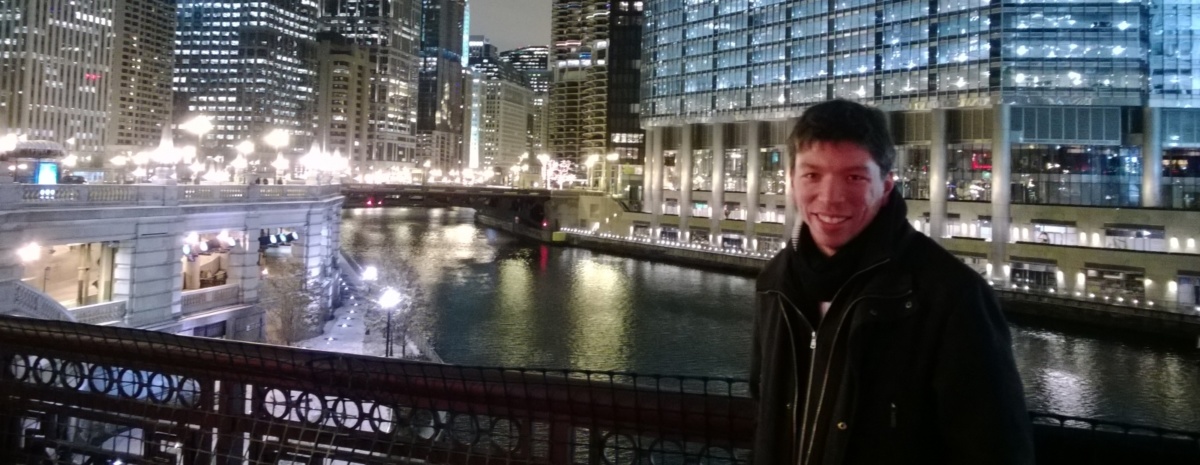The first in an occasional series of posts in which I can justify anything I do as anthropological research.
I’m sitting in a dentist’s chair opposite the window. I have a great view, because I’m 19 floors up in downtown Chicago. Opposite is Donald Trump’s controversial sign in giant letters on the side of a skyscraper. I’ve already filled out a host of forms, including a pointed reminder that I have to pay for anything not covered by my insurance, and we’re going through my family history for risk factors.
“Any history of cancer?”
“Well, my grandfather got lung cancer eventually…” I reply, “but he smoked all his life.” Satisfied, she notes this down as a risk factor, and I wonder how often he went to a dentist when he was my age.
We move on to my own health, and she asks if I have elevated stress levels. I say no, and then equivocate. I get stressed at work, I guess, but it’s mostly fun stress? “A lot of people with stressful jobs say yes, with a note that it’s work related”, she suggests. “I think I’ll leave it at no”, I decide. Having not bothered to go the dentist for years, I already know where this is going; if I’m going to do US healthcare, I want to start gently.
She leads me into another room where I place my head as instructed in the midst of a fancy spinning diagnostic machine. “WELCOME TO THE WORLD’S MOST ADVANCED DENTAL PHOTOGRAPHIC SYSTEM” boasts a somewhat sinister recorded message, before playing some classical music around my head. I smile at the absurdity, and the dentist smiles back, which is heartening. If someone in the 1960s had drawn a futuristic comic about a Space Dentist set on the Moon in the year 2014, they would have included this machine.
After much prodding at my teeth later, we’re ready to discuss my results. My teeth are great, but my gums are terrible, and there are helpful videos to illustrate what could happen if this situation is allowed to continue. Reluctantly, I concede in my own head that this seems legit. I’m going to have to start flossing – something which I’d previously dismissed as a conspiratorial joke between dentists. In the UK, when a dentist told me to floss, it was a bit like rebellious teenagers promising not to hold a wild house party when their parents left town for the weekend. Neither side really meant it, it was just something they had to say. But this woman really does want me to floss, and I’m a little scared what might happen if I don’t.
Then the dentist who runs the place arrives, and re-examines me, and agrees wholeheartedly with the existing diagnosis. (I suppose it would be awkward if he didn’t.) And if I agree to stick to my side of the bargain, I can come every three months over the next year to get everything deep-cleaned and fixed up. “Your mouth will feel better… your whole body will feel better!” he says brightly, which is going a little far for me – but as I say, the basics are sound. I don’t doubt that this is going to be good for me. I just want to know about costs.
Costs are handled by a third person, who comes in separately to talk about my insurance. (We’re almost two hours in at this point.) Their charge for all of this work over the year is $1000. She’s going to phone my insurance company to find out if they will agree to this fee. If they will, then they’ll pay 50% of it, after a $50 deducible. So already we’re down to $550, and I smile because I still have time to upgrade my insurance to a slightly-more-expensive but much-more-generous option, now that I know it’s going to be worth the money. Not everyone is so fortunate.
The nonsense of an insurance system is painful. There is no effective control on costs, and a great deal of needless waste and bureaucracy, for something which is fundamentally unsuited to an insurance model. Everyone needs medical care eventually. It’s not some rare event you can protect against by pooling risk, which is what insurance is for. That’s like having an insurance system for food, ‘in case you happen to get hungry’. And because I have a good job, I’m going to pay less than someone on lower pay with a worse job, which you don’t have to be a Marxist to realise is clearly ludicrous.
Equally as sad is that the relationship between the people in this room is all out of kilter. To be very clear: I have no doubt that I’m surrounded by good people who take some professional pride from their skill at stopping my teeth from falling out, and for that I am truly grateful. But due to forces beyond their control, we find ourselves in a consumer relationship. I have come to shop, and they are upselling. Only in this case my decisions are supposed to be life and death, based on claims I can’t possibly evaluate properly, which isn’t quite the same as deciding whether you can afford the smartphone with the better camera.
Fear works, too. When I got back to work, I also opted into vision insurance. I don’t have glasses, I don’t wear contacts – this is purely so that if I wake up and serendipitously decide I want an eye test, I can. More bloated costs, more waste, more fear. Just imagine what the US could achieve if it put its collective spend – by government, companies and individuals – into a real healthcare system.
The collective principle asserts that the resources of medical skill and the apparatus of healing shall be placed at the disposal of the patient, without charge, when he or she needs them; that medical treatment and care should be a communal responsibility; that they should be made available to rich and poor alike in accordance with medical need and by no other criteria…
Society becomes more wholesome, more serene, and spiritually healthier, if it knows that its citizens have at the back of their consciousness the knowledge that not only themselves, but all their fellows, have access, when ill, to the best that medical skill can provide.
By. No. Other. Criteria.
Since Grace and I have a relationship vaguely based on a shared hatred for a film that neither of us had actually seen, we thought it might be a good idea to finally sit down and watch Eat Pray Love to ensure that it really was as bad as all that. So in a sense it’s reassuring to report that, yes, it was. The following is a necessarily condensed summary of the film’s most glaring failings, although the cumulative effect of awful scene piled on top of awful scene can only really be appreciated through your own personal viewing of what can be, perversely, a rather enjoyable collection of failure.
Warning: contains spoilers, if it is at all possible to ‘spoil’ Eat Pray Love.
Let’s begin with a plot description nicked from Wikipedia:
Elizabeth Gilbert (Julia Roberts) had everything a modern woman is supposed to dream of having – a husband (Billy Crudup), a house, a successful career – yet like so many others, she found herself lost, confused, and searching for what she really wanted in life. Newly divorced and at a crossroads, Gilbert steps out of her comfort zone, risking everything to change her life, embarking on a journey around the world that becomes a quest for self-discovery. In her travels, she discovers the true pleasure of nourishment by eating in Italy; the power of prayer in India, and, finally and unexpectedly, the inner peace and balance of true love in Bali.
…except this is all a massive lie. For a start, Elizabeth does not have ‘everything a modern women is supposed to dream of having’. High on the list of things which she conspicuously lacks are intelligence, charm, forethought or – critically – any interests whatsoever. She is also prone to the strange delusion that she is the first person ever in the history of mankind to get divorced or take a holiday. Because that, incidentally, is the second great lie of this synopsis: the idea that Liz ‘risks everything’.
She goes on holiday.
That’s it: a holiday. Don’t get me wrong – I’m all in favour of holidays – but someone who claims to be going ‘out of her comfort zone’ in order to eat in restaurants deserves instant and lifelong social ostracism. Weirdly, Liz receives the opposite, being instantly befriended by just about everyone she encounters despite, as previously noted, a distinct personality deficit. And oh, how she is mollycoddled beyond all belief, at one point receiving a round of applause for managing to order spaghetti carbonara from a menu. (Although apparently carbonara is a bit of an unknown quantity in Hollywood, illustrated as it is with a shot of red sauce.) And when she isn’t being indulged like a dying child, Liz nods vacuously at various pieces of empty and contradictory life advice thrown at her by a motley collection of Americans with dodgy accents: let go of love, love again, give up control, take control, strive for balance, forget about balance.
In fact, when you think about it, one of the most offensive implications of the film is that the world is staffed by such a loving network of wise Americans that during your life-changing travels around the world you barely have to speak to anyone local at all. But then the world as presented by Eat Pray Love totters on the brink of being a surreal parody of real life, partly when it comes to poor old Italy. Rome (fucking Rome!) has apparently been subject to a freak distortion in the fabric of space-time, flung back to an era with no running water, no advertising, little traffic and the lurking threat of malaria. Still, at least there she deigns to walk the streets: her time in India and Bali largely consists of ‘risking everything’ by staying in luxurious compounds. And praying.
Yes, let’s come to the prayer. It is extraordinary, really, because this is a film which manages to insult the intelligence of both believers and non-believers alike. On the one hand, the assumption that Liz needs constant sprinklings of ‘spiritual enlightenment’ goes entirely unquestioned, and (naturally) it proves just as astonishingly effective as the carrot juice (“better than antibiotics”) used at one point to treat what basically amounts to a bruised knee but is treated by a hysterical Liz as a near-death experience. (Note: if your doctor is commenting on the state of your cartilage whilst treating a graze, something somewhere is going badly wrong.) But whilst generic spirituality is served up on demand, it is never presented as anything other than a glorified therapeutic tool. Liz doesn’t actually believe in anything, or – if she does – we don’t learn about it, because Liz doesn’t ever actually talk about anything other than her self-help programme. Even when she bores her friends into donating money so that the Cute Poor People in Bali can build a house, she’s still talking about herself.
Oh, and since she dons a new outfit for each and every scene, we can only conclude that her tiny bag is bigger on the inside.
There is so much more I could mention: the ultra-lazy visual shorthand (career men can’t hold babies, enlightened people light candles), the all-pervading Orientalism, the concept of liberation through eating pizza, the concept of liberation through eating pizza which you can’t get in New York, the most confused discussion of feminism since the English Defence League went on Newsnight, some terrible dialogue (most notably when we suddenly learn that her plane leaves “in two hours”) and the implication that almost killing your own child is just about comparable in the calamity stakes to divorce, and that’s not to mention the fact that this whole disaster of film-making takes nearly two and a half hours to unfold.
But maybe I should be grateful. If you showed this film en masse to young children in schools and taught them all to never, ever live their lives like Elizabeth Gilbert, you might just transform the world into a better place.
~
And on a totally different note, after all this we went off to Caroline’s for a very lovely evening of drinks, dips, pizza and cake. Delicious cake, in fact, and what with Saoirse’s baking masterpiece I feel I’m on a bit of a roll with cake at the moment. If only I could crack whatever accidental system has arisen for encouraging my friends to bake I could be set for life…









